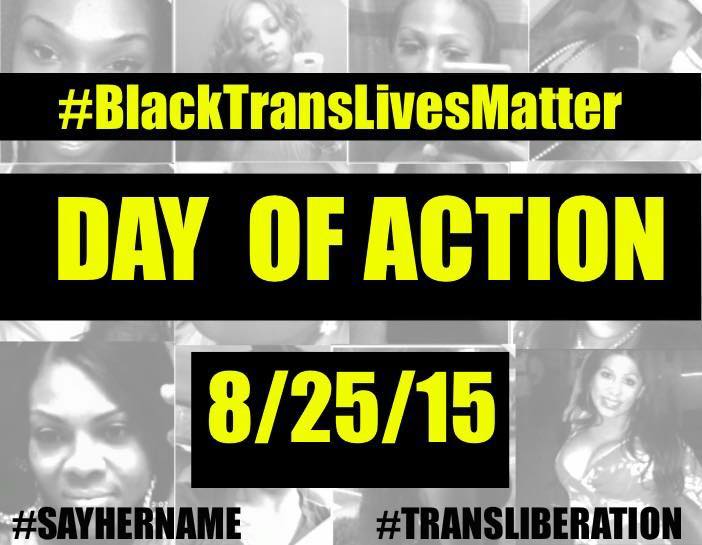[Image: Banner reading #BlackTransLivesMatter Day of Action 8/25/15. Behind the words are black and white photos of trans women of color who have been murdered.]
Today is #BlackTransLiberationTuesday, a day of action to call for an end to the epidemic of violence facing black trans women. I’ve written previously about this state of emergency, and the importance of trans people telling our own stories to dispel the ignorance and myths that lead to anti-trans discrimination and aggression.
Black trans women are particularly vulnerable to violence as they face multiple axes of oppression. Even those who “pass” – i.e., meet society’s cisnormative assumptions of what a woman should look like – have to deal with everyday racism and sexism, which impacts their access to education, employment, health care, and housing. They are affected by the same media bias and police profiling as black cis women. Some turn to sex work to survive, with all the inherent risk and stigma that entails. Many end up as victims of the prison-industrial complex.
Repeating the names of our fallen sisters is one way to emphasize the urgency of the situation. But we must not merely pathologize black trans women. We need to celebrate them. We need to celebrate those who can transition, and those who cannot. Those who live as openly trans, and those who do not. Those who are disabled, and those who are not. Those who are straight, lesbian, bisexual, queer, pansexual, asexual, or any other orientation.
Here are the stories of two living black trans women who don’t have the celebrity profile of Laverne Cox:
Alena Bradford is a woman living in Georgia. Economic circumstances forced her to move back in with her mother and live as a man.
Kat Blaque is an animator and vlogger, who speaks frequently about racism and sexism. She illustrated the story of her life and gender transition.
Get to know black trans women. Don’t solely mourn their deaths. Celebrate their lives.
